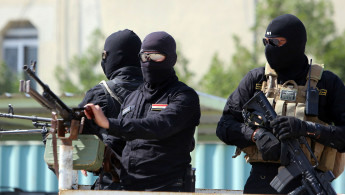Iraqi forces 'looted' and 'burnt' liberated villages
Iraqi troops and militia looted and burned homes and destroyed villages after braking months-long siege of a Turkmen town imposed by the Islamic State group, (IS, formerly known as ISIS) last August.
In a new briefing, the New York based Human Rights Watch said Wednesday that following the operations to end a siege of the town of Amerli, pro-government militias and volunteer fighters as well as Iraqi security forces raided Sunni villages and neighbourhoods around Amerli in Salaheddin and Kirkuk provinces."
"During the raids, militiamen, volunteer fighters and Iraqi security forces looted possessions of civilians who fled fighting during the onslaught on Amerli, burned homes and businesses of the villages' Sunni residents," the New York-based rights group said.
| Militia abuses are wreaking havoc among some of Iraq’s most vulnerable people and exacerbating sectarian hostilities. - Joe Strok. |
In its 31-page report, "After Liberation Came Destruction: Iraqi Militias and the Aftermath of Amerli," HRW also noted that Iraqi military and militia forces "used explosives and heavy equipment to destroy individual buildings or entire villages."
HRW said that many of the villages targeted in the raids were ones that IS militants had either passed through or used as bases to attack Amerli.
"Iraq can't win the fight against (IS) atrocities with attacks on civilians that violate the laws of war and fly in the face of human decency," its deputy Middle East and North Africa director, Joe Stork, said.
Strok warned that "militia abuses are wreaking havoc among some of Iraq’s most vulnerable people and exacerbating sectarian hostilities."
This report is not the first to point out human rights violations carried out by Iraqi army and Shia militias who have joined forces to re-take areas captured by IS group across the country.
Earlier this month, images and videos posted on social media appear to show US trained and armed Iraqi military units and Shia militia, key to the American strategy against IS, massacring civilians, torturing and executing prisoners in the offensive retake Tikrit.
The coalition government in Baghdad, led by prime minister Haidar al-Abadi, has said that it was launching an investigation into the actions of Shia fighters part of the majority-Shia Popular Mobilization Units, which make up most of the 30,000 force battling to recapture the city which was taken by IS fighters last June.
Back in October 2014, an Amnesty International report - "Absolut Impunity: Militia Rule in Iraq"- displayed harrowing details of sectarian attacks committed by the increasingly powerful Shia militia in Iraq, acting in "revenge for attacks by the armed group that calls itself the Islamic State (IS)".
According to the report "scores of unidentified bodies have been discovered across the country handcuffed and with gunshot wounds to the head, indicating a pattern of deliberate execution-style killings."
IS spearheaded an offensive last June that overran large areas north and west of Baghdad, sweeping security forces aside.
Reeling from the assault, Baghdad turned to Popular Mobilisation units - paramilitary forces that are dominated by pre-existing Shia militias.
The units have played a key role in the fight to drive IS back, but relying on such groups further entrenches them in Iraq, giving them an expanded power base that will be difficult to dislodge.
Donatella Rovera, Amnesty International's Senior Crisis Response Adviser, directed stinging criticisms toward the Iraqi government and called for halting cooperation with the militia forces.
"By granting its blessing to militias who routinely commit such abhorrent abuses, the Iraqi government is sanctioning war crimes and fuelling a dangerous cycle of sectarian violence that is tearing the country apart. Iraqi government support for militia rule must end now."





 Follow the Middle East's top stories in English at The New Arab on Google News
Follow the Middle East's top stories in English at The New Arab on Google News
![Israeli forces ordered bombed Gaza's Jabalia, ordering residents to leave [Getty]](/sites/default/files/styles/image_330x185/public/2176418030.jpeg?h=a5f2f23a&itok=_YGZaP1z)

